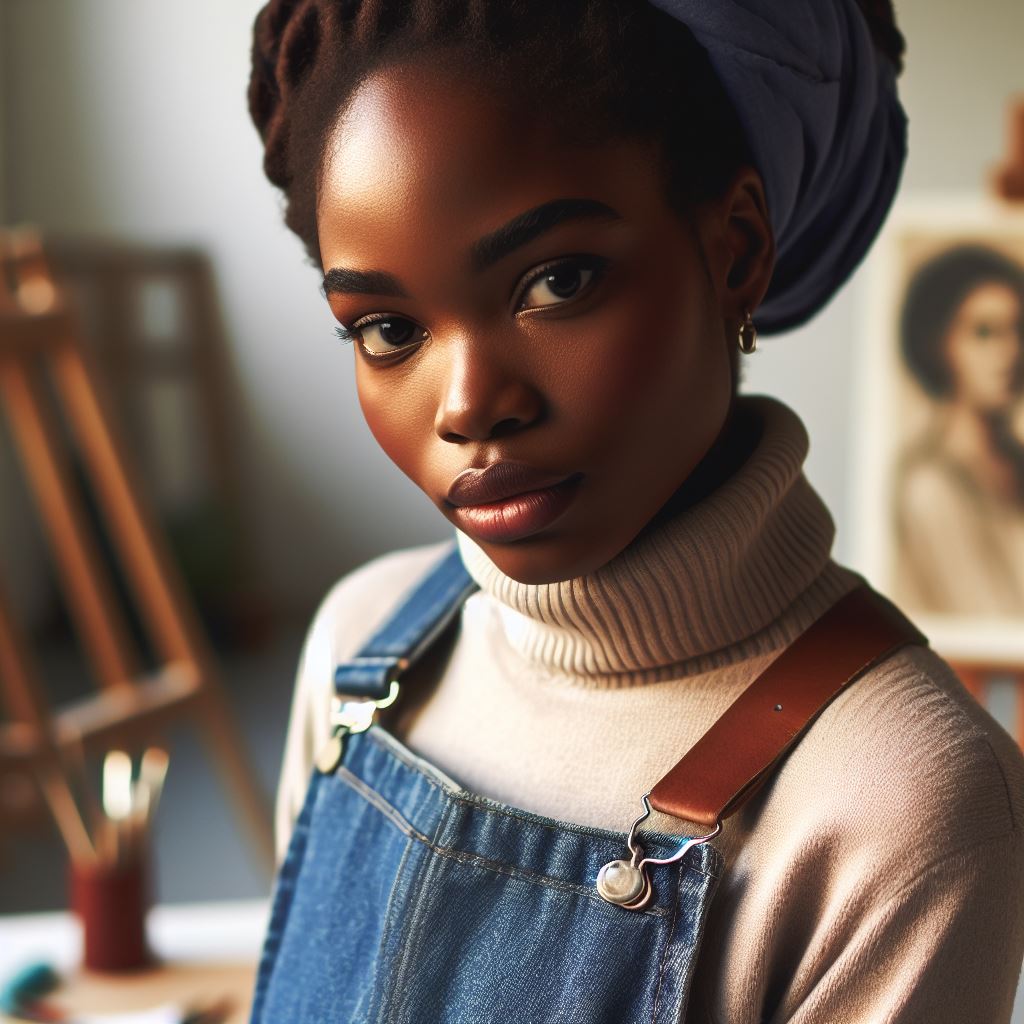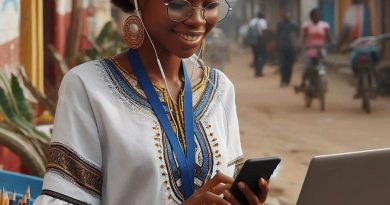Prominent Nigerian Artists You Should Know
Last Updated on May 25, 2024
Introduction
Nigeria boasts a vibrant artistic heritage, steeped in diverse cultures and traditions. Recognizing and celebrating Nigerian artists is crucial.
Nigeria’s artistic landscape reflects its dynamic history and cultural tapestry. Celebrating Nigerian artists promotes cultural exchange and appreciation globally.
Nigerian artists, from various disciplines, contribute significantly to the nation’s cultural identity.
Embracing Nigerian artistry fosters unity and pride within communities. Art serves as a powerful tool for social commentary and expression.
Recognizing Nigerian artists elevates their voices and narratives. Nigerian art embodies resilience, creativity, and innovation.
Celebrating Nigerian artists encourages investment in the local creative economy. Nigeria’s artistic legacy spans centuries, showcasing a wealth of talent.
Acknowledging Nigerian artists honors their contributions to global cultural discourse. By highlighting Nigerian artists, we preserve and amplify their legacies.
Nigeria’s artistic diversity enriches global cultural conversations. Recognizing Nigerian artists fosters cross-cultural understanding and appreciation.
Celebrating Nigerian artists empowers future generations to embrace their cultural heritage.
Nigeria’s artistic brilliance transcends borders, captivating audiences worldwide.
Embracing Nigerian artistry strengthens national and international cultural landscapes.
Recognizing Nigerian artists celebrates the richness and diversity of human expression.
Nigeria’s artistic community continues to inspire and influence the global art scene.
Celebrating Nigerian artists is not just an act of appreciation but a recognition of their invaluable contributions.
Fela Kuti
Known as a legendary musician and activist, Fela Kuti was born on October 15, 1938, in Abeokuta, Nigeria.
He was a pivotal figure in the development of Afrobeat, a genre that blends traditional Nigerian music with jazz, highlife, and funk.
Impact on Nigerian Music and Politics
Fela Kuti used his music as a tool to address social and political issues in Nigeria.
He was a vocal critic of the Nigerian government, often using his lyrics to criticize corruption and oppression.
His music became a voice for the marginalized and oppressed, inspiring a sense of resistance and revolution.
Famous Songs and Albums
One of Fela Kuti’s most famous songs is “Zombie,” a scathing critique of the Nigerian military.
His album “Expensive Shit” is another iconic work that showcases his unique blend of musical influences.
“Shakara” and “Water No Get Enemy” are also standout tracks that highlight his musical talent and social consciousness.
Personal Anecdotes and Quotes
Those who knew Fela Kuti describe him as a charismatic and passionate individual who exuded energy and creativity.
His former band members recall his commitment to his music and his dedication to speaking truth to power.
Fela Kuti’s son, Femi Kuti, has spoken about his father’s legacy and the impact he continues to have on Nigerian music and politics.
In essence, Fela Kuti was not just a musician; he was a revolutionary figure who used his art to spark change and challenge the status quo.
His fearless spirit and unapologetic stance against injustice continue inspiring artists and activists in Nigeria.
Read: Top Nigerian Art Schools for Aspiring Artists
Ben Enwonwu
Ben Enwonwu, born in 1917, is one of Nigeria’s most renowned painters and sculptors.
His exceptional talent and passion for art have solidified his place in the history of African art.
Background Information
Ben Enwonwu was born in Onitsha, Nigeria, and studied at the Goldsmiths College in London.
He was a pioneer artist who combined indigenous African traditions with Western art practices.
Contributions to African Art
Enwonwu played a vital role in the development of contemporary African art, showcasing the rich cultural heritage of Nigeria.
His works often depicted themes of Nigerian traditions, folklore, and societal issues, reflecting the country’s history and identity.
Famous Works and Exhibitions
One of his most famous works is the sculpture titled “Anyanwu,” which symbolizes the sun and is considered a masterpiece of Nigerian art.
Enwonwu’s paintings, such as “Tutu,” have also gained international recognition for their unique blend of realism and symbolism.
His works have been exhibited in prestigious galleries and museums worldwide, including the Tate Modern in London.
Influence on Younger Generations
Ben Enwonwu has been a significant inspiration for younger generations of Nigerian artists, encouraging them to embrace their cultural heritage in their art.
His legacy continues to inspire artists to explore new ways of expressing their identities and narratives through their work.
In fact, Ben Enwonwu’s impact on the art world has been profound, with his legacy living on through his timeless works and influence on future generations of African artists.
Read: How to Build a Successful Beauty Therapy Portfolio
Chinua Achebe
The influential Nigerian author and poet
Chinua Achebe was born on November 16, 1930, in Ogidi, Nigeria. He is widely regarded as one of the most important figures in African literature.
Achebe’s works often explore themes of colonialism, culture clash, and the effects of Western influence on African societies.
The themes and messages in his most notable literary works
One of his most notable works is “Things Fall Apart,” published in 1958.
The novel tells the story of Okonkwo, a respected leader in a traditional Nigerian village who struggles to maintain his cultural identity in the face of British colonization.
Through this narrative, Achebe challenges Western representations of Africa and offers a nuanced portrayal of Nigerian society.
His role in shaping Nigerian literature and the global literary landscape
In addition to “Things Fall Apart,” Achebe wrote several other acclaimed novels, including “Arrow of God,” “No Longer at Ease,” and “A Man of the People.”
These works continue to be studied in schools and universities around the world for their insightful commentary on African history and culture.
Achebe’s contributions to Nigerian literature cannot be overstated.
He played a key role in the development of the post-colonial literary movement in Africa, using his writing to reclaim the narrative of African experiences from a Western perspective.
Achebe’s work has inspired generations of African writers to tell their own stories and challenge the dominant narratives of the colonial past.
Awards and recognition received during his career
Throughout his career, Achebe received numerous awards and honors for his literary achievements.
In 2007, he was awarded the Man Booker International Prize for his significant impact on world literature.
Universities worldwide have bestowed honorary degrees upon Achebe, solidifying his legacy as a literary trailblazer.
In short, Chinua Achebe’s contributions to Nigerian literature have had a lasting impact on the global literary landscape.
Through his powerful storytelling and insightful commentary, he has shaped the way we understand African history and culture.
Achebe’s work continues to be celebrated and studied, ensuring that his legacy will endure for generations to come.
Read: Natural Beauty Therapy Methods Popular in Nigeria

Nike Davies-Okundaye
The celebrated Nigerian textile and fashion designer
Nike Davies-Okundaye is a celebrated Nigerian textile and fashion designer who has made a significant impact on promoting traditional Nigerian art forms.
She is renowned for her intricate and vibrant creations that showcase the rich cultural heritage of Nigeria.
Through her work, she has helped preserve indigenous crafts and traditions that are at risk of being lost.
Okundaye is not only an artist but also an educator, running art studios and workshops dedicated to passing on her knowledge to the next generation.
Impact on Promoting Traditional Nigerian Art Forms
Okundaye’s dedication to showcasing traditional Nigerian art forms has played a vital role in keeping these cultural practices alive.
She has brought international attention to Nigerian textile arts such as Adire, a traditional Yoruba indigo-dyed cloth.
By incorporating these traditional elements into her designs, she has helped elevate them to a global audience.
Okundaye’s work serves as a bridge between the past and the present, honoring Nigeria’s artistic legacy while adapting it for modern sensibilities.
Art Studios and Workshops
Okundaye’s art studios and workshops are hubs of creativity where artists can learn and practice traditional Nigerian crafts.
These spaces are not only places for creating art but also serve as cultural centers that celebrate Nigeria’s artistic heritage.
Okundaye’s commitment to passing down these skills ensures that future generations will continue to carry on these traditions.
Visitors to her studios and workshops can immerse themselves in the vibrant world of Nigerian art and craft, learning directly from the master herself.
Collaborations with International Designers and Museums
Okundaye’s collaborations with international designers and museums have further elevated Nigerian art on a global stage.
Her partnerships with designers from around the world have brought a contemporary twist to traditional Nigerian art forms.
Exhibitions in renowned museums have showcased Okundaye’s work, highlighting the cultural significance and beauty of Nigerian artistry.
These collaborations not only introduce Nigerian art to new audiences but also foster a deeper appreciation for the country’s artistic traditions.
In general, Nike Davies-Okundaye’s passion for preserving and promoting traditional Nigerian art forms has had a lasting impact on the artistic landscape of the country.
Through her art, studios, workshops, and collaborations, she continues to inspire and educate others about the beauty and richness of Nigerian heritage.
Read: Importance of Continuing Education in Cosmetology
TY Bello
TY Bello is a multi-talented Nigerian artist known for her work as a photographer and singer-songwriter.
She has made significant contributions to both fields and has become a prominent figure in Nigerian art and culture.
Profile
TY Bello was born in Ogun State, Nigeria, on January 14, 1978.
She started her career as a member of the gospel group Kush, which was formed in the early 2000s.
Bello later transitioned to photography and has since gained recognition for her visually stunning work.
She is known for her striking portraits and fashion photography, capturing the beauty of Nigerian culture.
Rise to Fame
TY Bello gained widespread fame in 2011 when she photographed the cover for the now-famous “Thisday” magazine featuring British-Nigerian rapper Tinie Tempah.
Her skills as a photographer quickly gained her acclaim, leading to collaborations with various fashion brands and magazines.
In addition to her work in photography, TY Bello is also a talented singer-songwriter and has released several albums, showcasing her musical prowess.
Significant Projects
One of TY Bello’s most significant projects is her “Eid el-Kabir” photo series, which celebrates the Muslim festival of sacrifice through stunning imagery.
She has also worked on projects that highlight the beauty and diversity of Nigerian culture, showcasing the country’s rich heritage through her lens.
TY Bello’s work transcends boundaries and showcases the beauty of Nigeria to the world, challenging stereotypes and celebrating the country’s culture.
Activism and Philanthropy
TY Bello is actively involved in activism and philanthropic work in Nigeria, using her platform to advocate for social change and address key issues in society.
She has worked on projects focused on promoting gender equality, empowering women and youth, and advocating for the rights of marginalized communities.
Through her art and advocacy, TY Bello has made a positive impact on Nigerian society, inspiring change and promoting social justice.
In review, TY Bello is a talented and influential artist whose work has transcended boundaries and showcased the beauty of Nigerian culture to the world.
Through her photography and music, she has made a significant impact on Nigerian art, activism, and philanthropy, leaving a lasting legacy for future generations.
El Anatsui
El Anatsui is a prominent Ghanaian-born Nigerian sculptor celebrated for his monumental metal works.
His artistic prowess has garnered global recognition and admiration for his unique and innovative creations.
Inspiration and Process
Anatsui sources thousands of discarded aluminum bottle caps from local liquor markets in Nigeria for his iconic tapestries.
He meticulously intertwines and links these caps together to create stunning and elaborate tapestries that challenge traditional notions of sculpture and textile art.
His process involves flattening and shaping these metal bottle caps before piecing them together using copper wire.
The result is a visually striking mosaic of colors and textures that resemble shimmering textiles on a grand scale.
Global Impact
El Anatsui’s work transcends geographical boundaries and cultural barriers, attracting audiences worldwide with its inherent beauty and thought-provoking messages.
His art reflects themes of consumption, waste, globalization, and African identity, resonating with viewers on a profound level.
Anatsui’s pioneering of contemporary African art significantly influences the art world’s trajectory, inspiring artists to experiment.
His innovative approach to sculpture has redefined the boundaries of what art can be and has earned him a revered status in the global art community.
Exhibitions and Installations
Anatsui’s works grace renowned exhibitions worldwide: Venice Biennale, Documenta, and Smithsonian’s National Museum of African Art.
His monumental tapestries have graced the walls of galleries, museums, and public spaces, captivating audiences with their sheer scale and beauty.
“Gravity and Grace,” a renowned installation, graced the 2012 Venice Biennale, adorning Palazzo Fortuny with its massive tapestry.
The awe-inspiring spectacle garnered critical acclaim and solidified Anatsui’s reputation as a master of contemporary art.
Overall, El Anatsui’s contributions to the art world are immeasurable, as he continues to push boundaries and challenge conventions with his awe-inspiring metal tapestries.
His legacy as a visionary artist will endure for generations to come, inspiring future artists to explore new possibilities and redefine the parameters of artistic expression.
Conclusion
Eniwoke Ibagere is a renowned Nigerian artist known for his unique fusion of traditional African art styles with contemporary techniques.
Zainab Olagunju is a talented sculptor whose work often explores themes of feminism, culture, and identity in Nigeria.
Chinyere Okafor is a celebrated painter whose vibrant and expressive pieces capture the beauty and essence of Nigerian culture.
Segun Aiyesan is a groundbreaking multimedia artist known for his thought-provoking installations that challenge societal norms and conventions.
Celebrating and supporting Nigerian artists is crucial to preserving and promoting the rich cultural heritage of the nation.
Readers are encouraged to explore the works of these prominent figures to appreciate the diverse talents present in the Nigerian art scene.
The creativity and innovation displayed by Nigerian artists demonstrate the wealth of artistic talent within the country.


